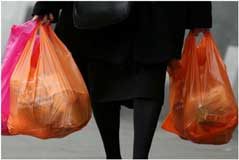PRA Chinese
Rubber Journal Asia Injection Moulding Asia Energy, Oil & Gas Asia
VISIT OUR OTHER SITES:
PRA Chinese
Rubber Journal Asia
Injection Moulding Asia
Energy, Oil & Gas Asia
World’s toughest law against plastic bags implemented in Kenya

The world’s strongest law against the manufacture, sale and use of plastic bags came into full effect in Kenya recently as the East African nation joins the list of African countries – including Cameroon, Ethiopia, Guinea-Bissau, Malawi, Mali, Mauritania, Rwanda, Tanzania, and Uganda – that have full or partial plastic bag bans in place.
It is the country’s third attempt at a ban in the past ten years, and it comes with harsh penalties. It is mostly aimed at manufacturers and suppliers but those who are caught using or simply carrying plastic bags risk up to four years of imprisonment or up to US$40,000 in fines.
About 40 countries worldwide, including China, France and Italy, have a similar law but with far less severe penalties. Other parts of the world have more commonly erred on the side of taxing single-use plastic bags as a way of reducing their use.
In Kenya alone, 100 million plastic bags are handed out each year, which often litter the streets in urban areas in the country, according to the United Nations Environmental Program (UNEP).
The bags can take years to decompose and can kill street animals if they are ingested; clog drains and sewers and contribute to flooding and the spread of disease. If dumped near rivers or coasts, these plastic bags drift into the ocean, strangling turtles, suffocating seabirds and filling the stomachs of dolphins and whales with waste until they die of starvation.
“If we continue like this, by 2050, we will have more plastic in the ocean than fish,” said Habib El-Habr, an expert on marine litter working with the UNEP in Kenya.
However, not everyone is in favour of the law. Local manufacturers are saying the production of plastic bags creates jobs for the people. Samuel Matonda, spokesman for the Kenya Association of Manufacturers, said it would cost 60,000 jobs and force 176 manufacturers to close. Kenya is a major exporter of plastic bags to the region.
“The knock-on effects will be very severe,” Matonda said. “It will even affect the women who sell vegetables in the market – how will their customers carry their shopping home?”
But the Kenyan government took pains to assure the public that the “common man” would not suffer from the ruling.
Plastic bag alternatives, such as cloth bags, are now being offered in large supermarket chains in Kenya, like France’s Carrefour and Nakumatt.
(PRA)Copyright (c) 2017 www.plasticsandrubberasia.com. All rights reserved.























































